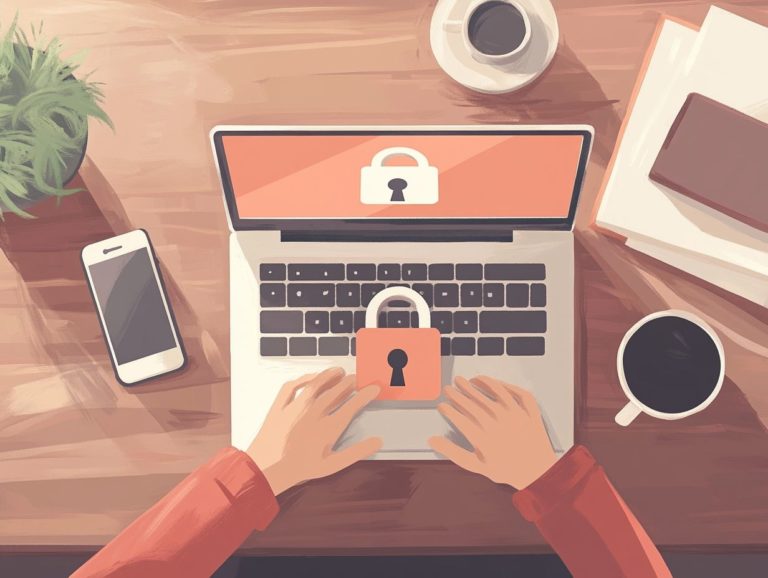what is the importance of cyber hygiene?
In today s digital landscape, maintaining strong online safety practices is essential for both individuals and organizations.
As cyber threats evolve daily, grasping the nuances of online safety practices and their importance can effectively safeguard your data and privacy. This article delves into the concept of cyber hygiene, highlighting its significance in protecting against cyber attacks, along with essential best practices you should implement.
It also addresses the potential repercussions of overlooking cyber hygiene and underscores the necessity of training employees in a workplace environment. Staying informed is key to your safety in this ever-changing digital world.
Contents
- Key Takeaways:
- Understanding Cyber Hygiene
- Why Cyber Hygiene is Important
- Best Practices for Good Online Habits
- Consequences of Poor Online Security
- Cyber Hygiene in the Workplace
- Frequently Asked Questions
- What is the importance of cyber hygiene?
- How does cyber hygiene protect against cyber attacks?
- What are some examples of good cyber hygiene practices?
- How does cyber hygiene protect personal information?
- Why is cyber hygiene important for organizations?
- How Often Should Cyber Hygiene Practices Be Implemented?
Key Takeaways:
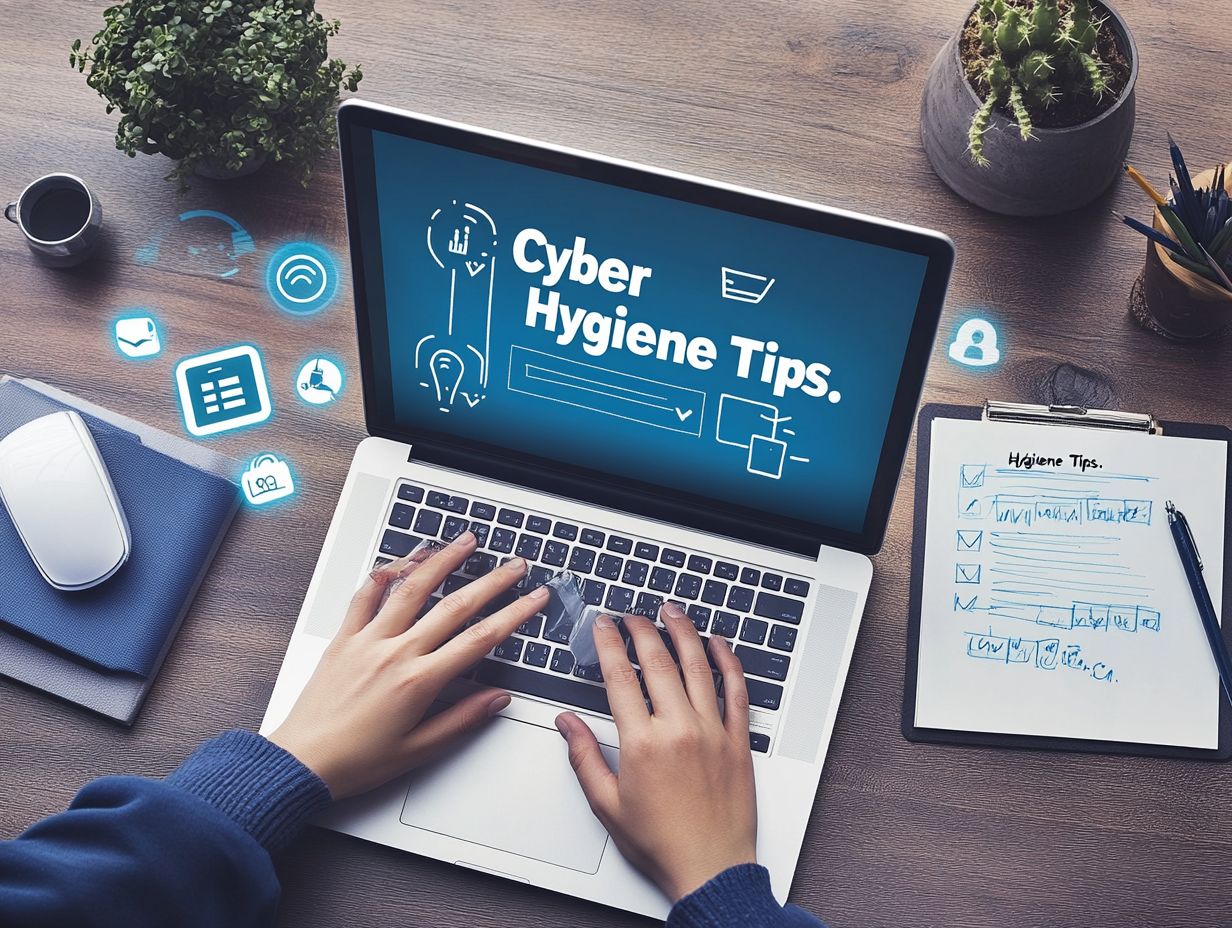
Online safety practices are the practice of maintaining a clean and secure online environment. They are essential for protecting against cyber attacks and maintaining data privacy and security. Regular updates, strong firewalls, and employee training are key best practices for maintaining good cyber hygiene.
Understanding Cyber Hygiene
Understanding cyber hygiene is crucial in today s digital landscape. It encompasses the practices and strategies that empower organizations to maintain a robust security posture against an ever-evolving array of cyber threats.
By embracing effective cyber hygiene practices, you can significantly mitigate malware risks and enhance your data protection. This involves a comprehensive approach to user access management, ensuring regular software updates, and implementing strong security protocols to safeguard your IT resources and preserve information integrity.
Defining the Concept
Cyber hygiene encompasses the practices and processes you and your organization adopt to uphold the integrity, confidentiality, and availability of your data and IT assets. It’s all about the routine actions you take to protect your digital environment from a constantly shifting landscape of cyber threats.
For instance, regularly updating your software and applications ensures that vulnerabilities are patched without delay, while using strong, unique passwords can dramatically lower the risk of unauthorized access.
Incorporating antivirus software and performing regular system scans further enhances your defenses. Educating employees on recognizing phishing attempts creates a culture of awareness that significantly boosts overall security.
All these efforts work together to create a solid cybersecurity framework that not only shields you from immediate dangers but also fosters trust among customers and stakeholders.
Why Cyber Hygiene is Important
The importance of cyber hygiene truly cannot be overstated; it acts as your first line of defense against a myriad of cyber threats that could jeopardize your data privacy.
Ignoring this crucial practice can lead to costly financial losses and tarnish your reputation, potentially exposing you to security breaches and identity theft.
Prioritizing cyber hygiene is not just wise it’s essential.
Protecting Against Cyber Attacks
Protecting against cyber attacks hinges on your commitment to effective cyber hygiene practices, which can significantly bolster your organization’s security posture and diminish the risk of malware infiltration.
Regular software updates aren’t just important; they’re essential for fixing known vulnerabilities. Don’t wait until it’s too late!
Endpoint protection, which refers to security measures for devices like computers and smartphones, is another critical facet, acting as your first line of defense. According to a report from Cybersecurity Ventures, companies that implement comprehensive endpoint security solutions enjoy 70% fewer incidents.
Moreover, investing in security awareness training gives your employees the tools to identify phishing attempts and suspicious activities. This proactive measure proves invaluable, as organizations that prioritize training have seen a remarkable 60% reduction in successful cyber attacks.
When these practices are consistently applied, they forge a formidable defense against the ever-evolving landscape of cyber threats.
Start implementing these practices today to strengthen your online safety!
Protect Your Data Privacy and Security!
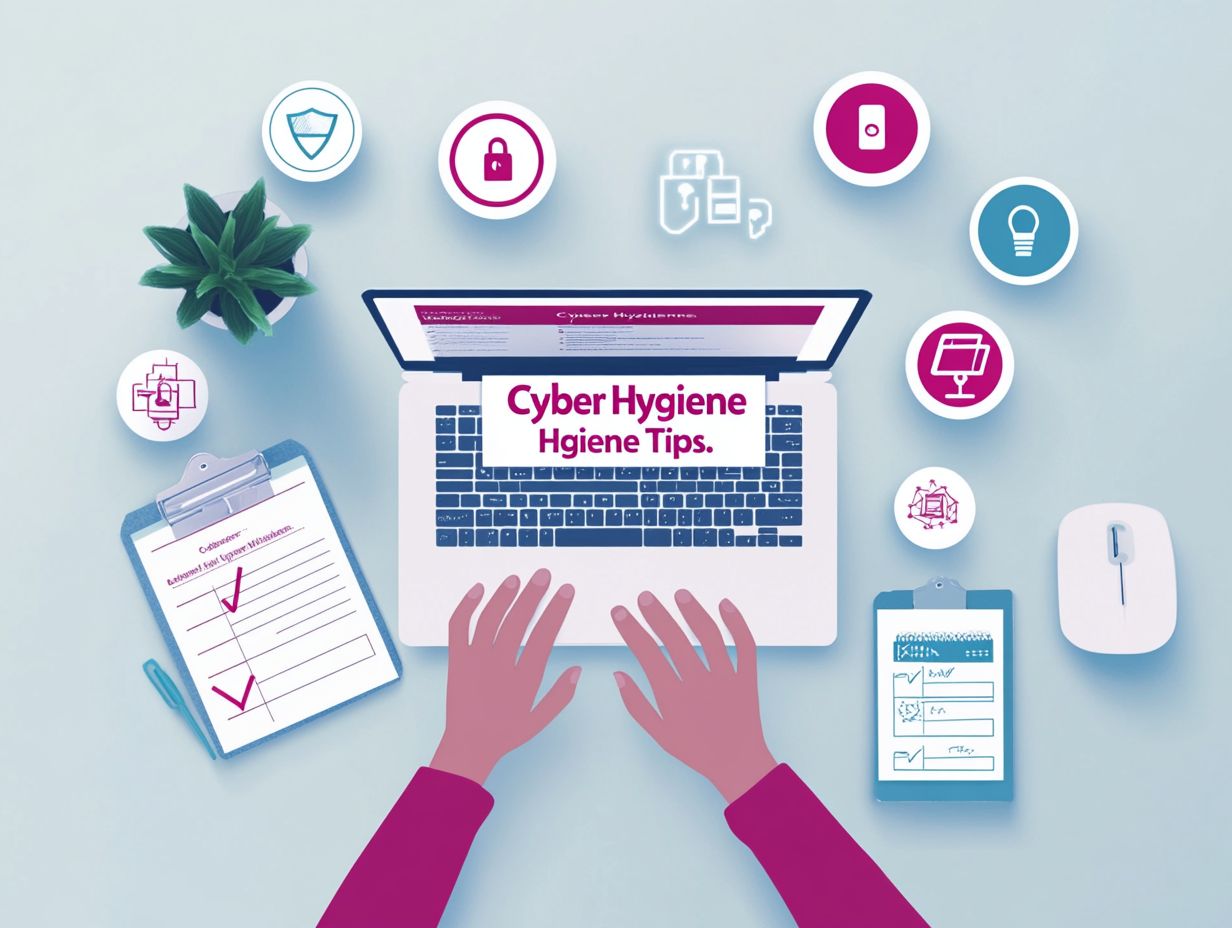
Maintaining data privacy and security is vital for effective cyber hygiene. It ensures that your sensitive information remains protected from unauthorized access and cyber threats.
In today s digital landscape, data breaches can lead to severe consequences. It s crucial to adopt robust measures. Good online habits not only protect your privacy but also enhance your organization s reputation.
Utilizing advanced encryption techniques can transform your data into unreadable formats. This makes it significantly more challenging for attackers to exploit vulnerabilities.
By implementing stringent access control policies, you ensure that only authorized personnel can access specific datasets. This effectively minimizes your risk.
Proper data classification gives you the power to identify which information is most sensitive and demands strict protection. This elevates your overall data protection strategies.
Together, these elements create a comprehensive approach to maintaining confidentiality and integrity in our increasingly interconnected world.
Best Practices for Good Online Habits
Implementing best practices for good online habits is essential for cultivating a secure digital environment. By doing so, you significantly reduce the risks associated with malware and improve your password management.
Each of these elements plays a critical role in safeguarding against cyber threats. They allow you to navigate the online world with greater confidence and security.
Regular Software Updates and Password Changes
Regular software updates and routine password changes are essential components of effective cyber hygiene. They significantly lower your risk of security incidents and vulnerabilities.
These updates patch known weaknesses that malicious actors might exploit. They also introduce enhancements that strengthen your overall security features.
By adopting best practices for password management, you can greatly elevate your protection. Using strong, unique passwords for different accounts, paired with multi-factor authentication, adds an invaluable extra layer of security.
Prioritizing these strategies helps both individuals and organizations protect sensitive information from unauthorized access. This creates a more secure digital environment for everyone involved.
Implementing Strong Firewalls and Antivirus Software
Implementing strong firewalls and robust antivirus software is vital for establishing a formidable defense against cyber threats. These tools ensure effective endpoint protection.
Firewalls act as barriers, filtering network traffic based on established rules. Antivirus software scans and removes malware, preventing infections before they can cause damage.
To maximize their effectiveness, regularly update both tools and tailor their configurations to suit your network environment. Also, adopt safe browsing habits to enhance your protection.
Consequences of Poor Online Security
Neglecting your online security can lead to severe consequences!
You could face security breaches, substantial data loss, and a heightened risk of identity theft. All these issues can severely undermine your organization s reputation and financial stability.
Potential Risks and Damages
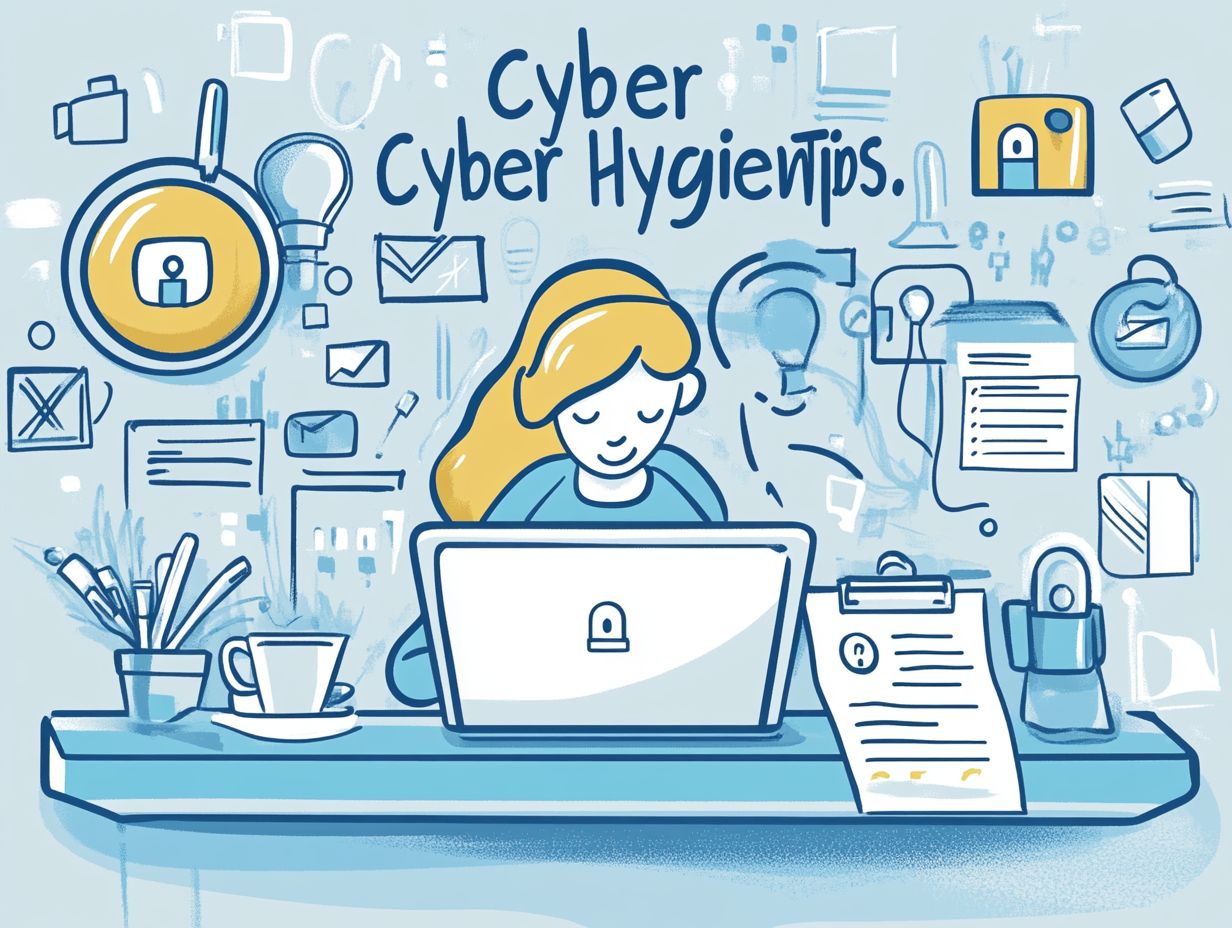
Inadequate cyber hygiene can expose you to a spectrum of risks and damages, ranging from financial losses due to security incidents to severe reputational harm and legal complications.
When organizations overlook fundamental security measures, they often become easy prey for significant data breaches. Recent studies indicate that these breaches can cost enterprises an average of $3.86 million per incident.
A glaring example is the infamous Equifax breach of 2017, where the failure to patch a known vulnerability compromised the sensitive data of around 147 million individuals.
Small businesses, often viewed as softer targets, face disproportionately harsh consequences. Approximately 60% of them shut down within six months of experiencing a cyberattack.
The cumulative impact of these incidents not only strains financial resources but also devastates customer trust and loyalty.
This underscores the urgent need for robust cyber hygiene practices.
Cyber Hygiene in the Workplace
Implementing effective cyber hygiene practices in your workplace is essential for cultivating a culture of security awareness.
By doing so, you protect your valuable data assets from potential cyber threats, ensuring that your organization remains resilient in the face of increasing risks.
Training and Education for Employees
Training and education for employees are essential elements in creating strong cyber hygiene practices. Empower you and your team with the knowledge needed to identify and respond to potential cybersecurity threats.
These programs not only elevate individual awareness but also cultivate a culture of awareness in your workplace. Engaging workshops, interactive simulations, and timely updates on emerging threats can transform your employees into an active line of defense.
For example, specialized training that focuses on recognizing phishing attacks equips staff with the skills to detect those subtle signs of deception.
Implementing programs that cover best practices for password management and safe internet usage can significantly mitigate vulnerabilities.
By investing in comprehensive training initiatives, you ensure that your employees are not merely passive users of technology but informed participants in shaping a safer digital environment.
Frequently Asked Questions
What is the importance of cyber hygiene?
Cyber hygiene means keeping your online activities and data safe. It is crucial for protecting against cyber attacks and maintaining the security of online data.
How does cyber hygiene protect against cyber attacks?
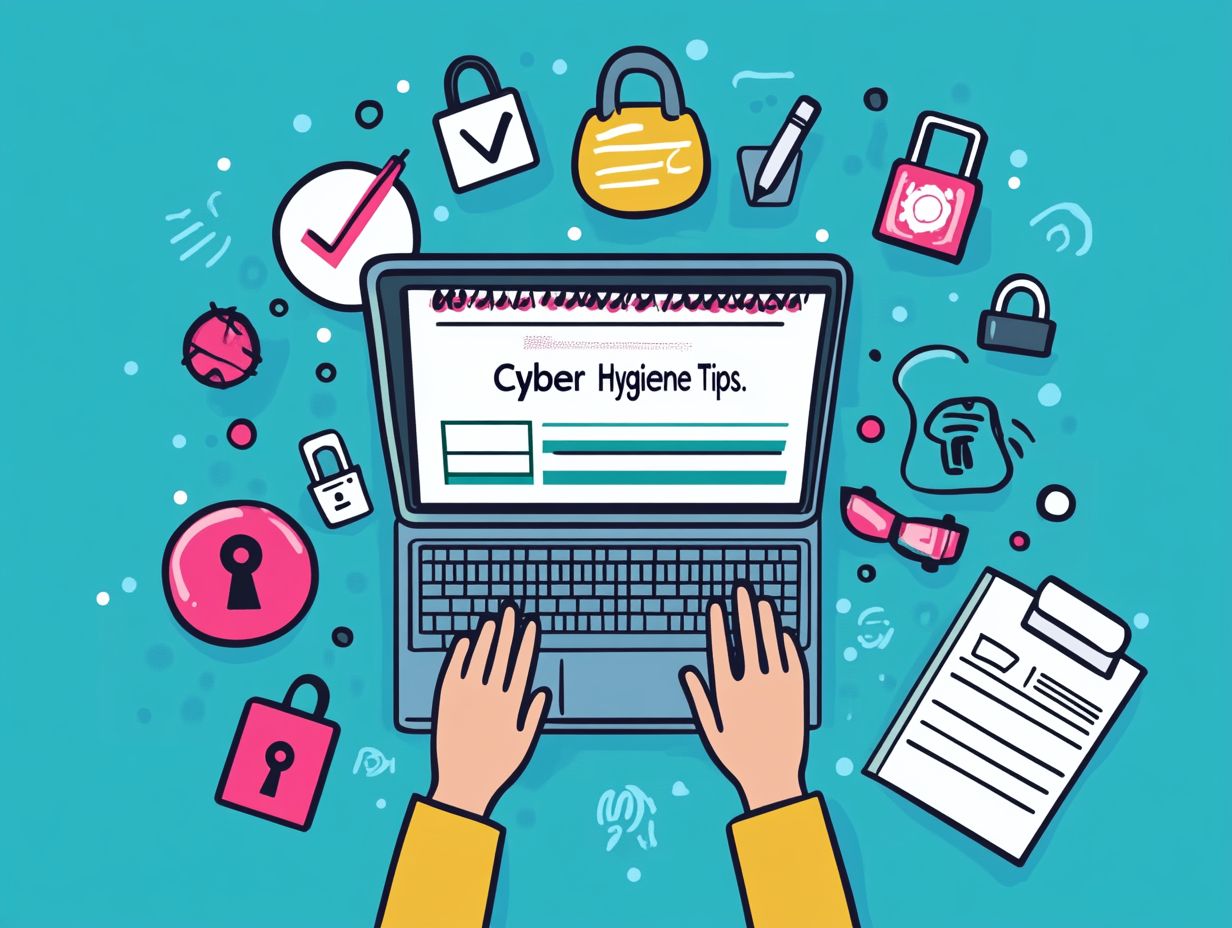
By following good cyber hygiene practices, such as regularly updating software and using strong passwords, individuals and organizations can prevent vulnerabilities that hackers can exploit to gain access to their devices or information.
This reduces the risk of falling victim to cyber attacks.
What are some examples of good cyber hygiene practices?
- Use unique and complex passwords
- Regularly update software and operating systems
- Avoid suspicious links or emails
- Use antivirus software
- Back up important data
- Limit personal information shared online
How does cyber hygiene protect personal information?
Personal information, such as financial data or sensitive personal details, can be vulnerable to cyber attacks if proper cyber hygiene is not practiced.
By following good cyber hygiene habits, individuals can prevent their personal information from being accessed, stolen, or used by hackers.
Why is cyber hygiene important for organizations?
Organizations often store sensitive information, such as employee and client data, on their systems. By practicing good cyber hygiene, they can protect this information and maintain the trust of their stakeholders.
It can also prevent costly data breaches and legal repercussions.
How Often Should Cyber Hygiene Practices Be Implemented?
Implement cyber hygiene practices regularly. This means updating software and changing passwords every few months.
Cyber hygiene refers to the routine practices that protect your digital devices and information. Stay informed about new cyber threats and adjust your practices based on what you learn.



